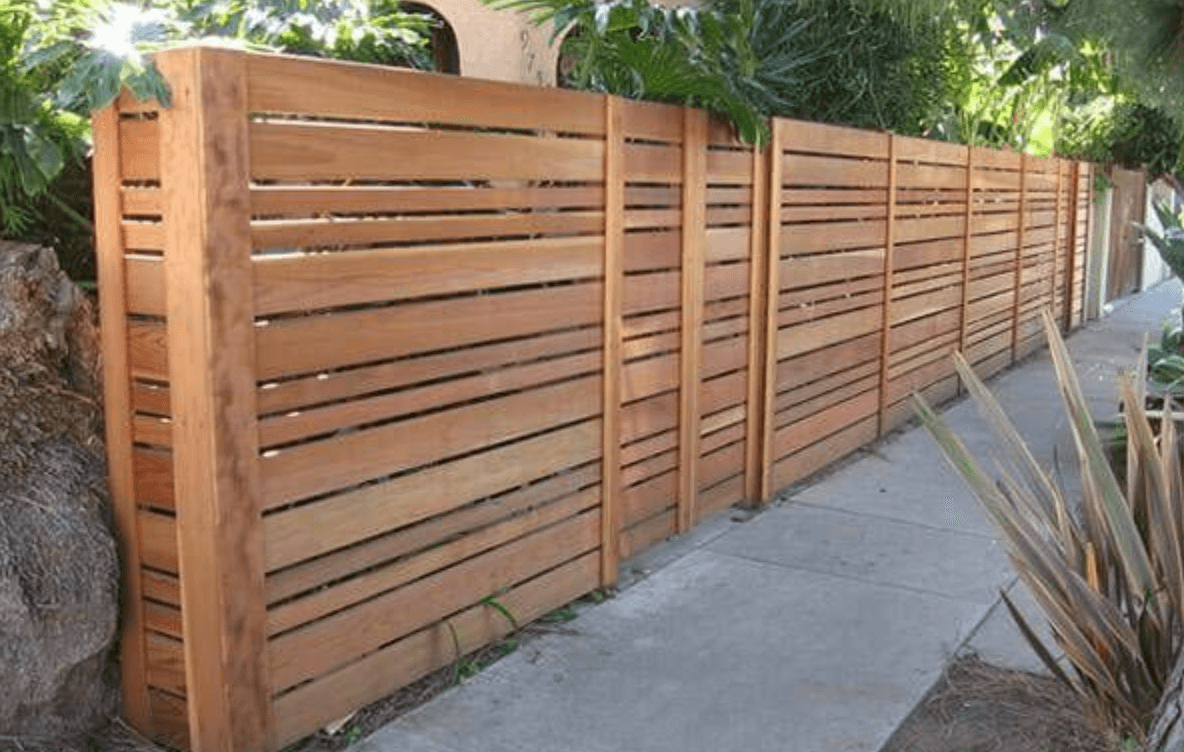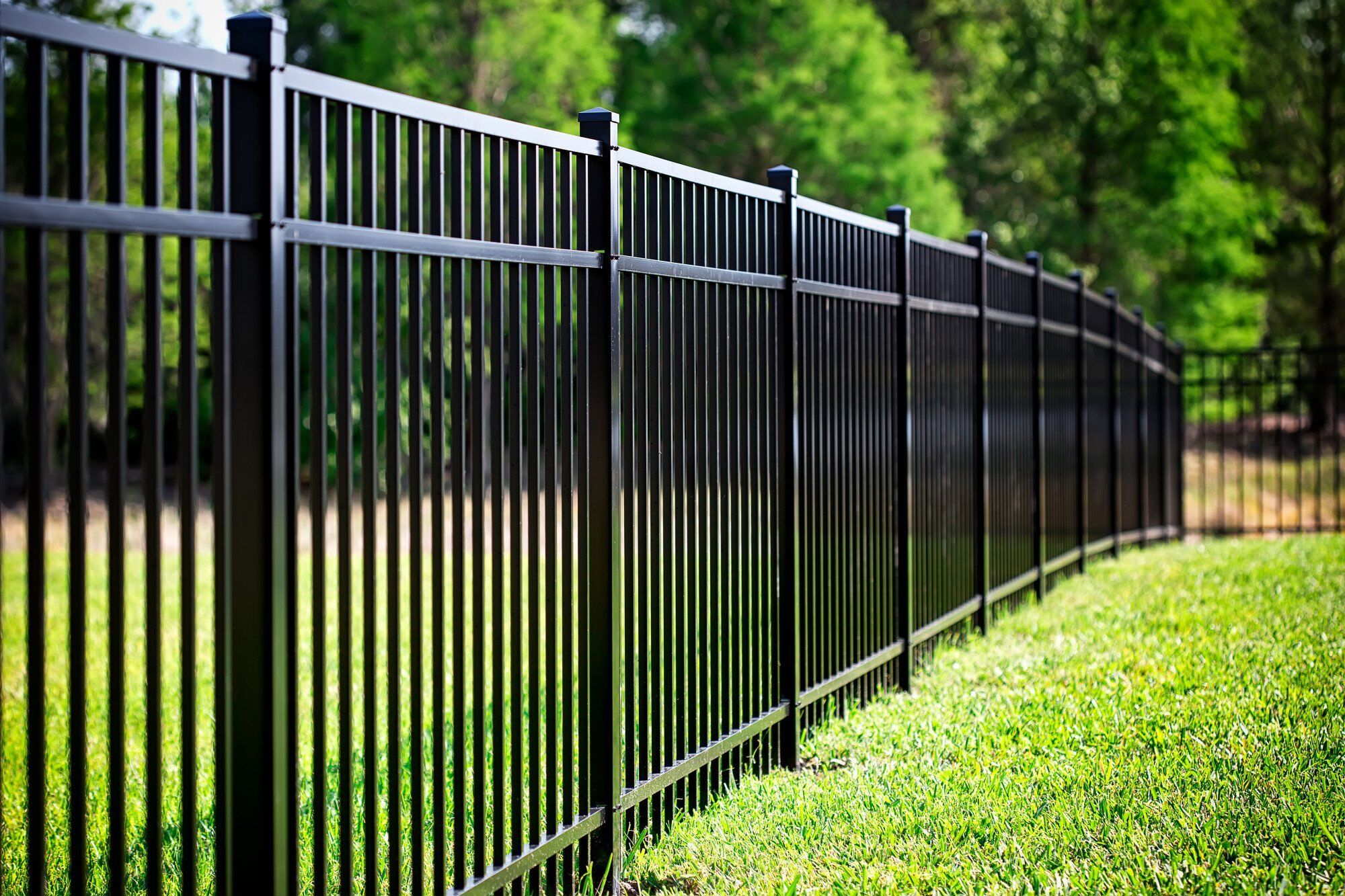All Categories
Featured
When picking a fencing for your building, it's vital to take into consideration factors like price, durability, maintenance, and aesthetic appeal. Three of the most preferred products for residential and commercial fencings are vinyl, timber, and light weight aluminum. Each offers distinct benefits and some disadvantages, making it important to assess your requirements prior to making a choice. Below, we compare the advantages and disadvantages of these products to aid assist your selection.
Timber Fence. Pros:
![]()
All-natural Visual: Wood fencings are recognized for their classic, natural look. They can conveniently mix into most landscapes and boost the charm of your home or service. Whether you're going for a rustic look or a more polished surface, wood can be tailored with paint, stain, or sealant. Personalization: Wood is one of the most versatile products, permitting a variety of designs, such as picket fences, privacy fencings, and ranch-style enclosures. It's simple to readjust the style to fit the details needs of your property. Affordable: Usually, wood fences come at a lower initial cost contrasted to plastic or light weight aluminum, making them an economical alternative for those on a spending plan. Disadvantages:
Upkeep Requirements: Wood fencings require regular maintenance to preserve their beauty and functionality. This includes staining or painting to protect against rot, termites, and weather condition damages. Without correct treatment, timber can break down over time. Much Shorter Lifespan: Contrasted to vinyl or light weight aluminum, timber fences have a tendency to have a shorter life expectancy, especially in areas with severe climate. Severe problems, such as heavy rain, humidity, or snow, can trigger wood to weaken faster. Prone to Damages: Timber fencings are at risk to harm from parasites, including termites, in addition to natural wear from climate. They might likewise warp or split if not effectively preserved. Vinyl Fence. Pros:
Reduced Maintenance: One of the major advantages of plastic fences is that they call for very little upkeep. Unlike wood, plastic does not need to be painted, secured, or stained. It's immune to fading, discoloration, and breaking, which conserves time and cash on upkeep. Sturdiness: Vinyl is known for its ability to withstand severe climate condition without weakening. It's resistant to insects like termites, and its resistance to wetness and UV rays guarantees it stays looking good for many years. Resilient: A plastic fencing can last as much as 30 years or more, making it a fantastic long-lasting investment. Lots of makers use guarantees, even more improving its worth. Range of Styles: Vinyl fencings are offered in numerous colors and styles, including those that mimic wood. You can pick from privacy, picket, or decorative designs, providing versatility to match your home or business. Disadvantages:
![]()
Greater Upfront Price: Vinyl fences have a tendency to have a greater preliminary expense than timber. While the long-term savings on upkeep are significant, the upfront investment might be a deterrent for some house owners. Restricted Personalization: Vinyl fencings been available in basic styles, and while shades and designs are varied, you may not have as much flexibility for personalization compared to timber. Fracturing in Cold Climates: While vinyl is long lasting, in incredibly cool environments, it can end up being breakable and crack upon impact, which could be troublesome in areas with extreme winters months. Light weight aluminum Fencing. Pros:
Reduced Maintenance: Light weight aluminum fencings are known for their low-maintenance needs. Unlike timber, light weight aluminum does not corrosion or rust, and it doesn't need to be painted or sealed. This makes it a wonderful option for those that want a convenient alternative. Resilience and Stamina: Light weight aluminum is a robust material that stands well to extreme climate conditions. It's an outstanding choice for seaside areas where deep sea rust is a worry, as it's immune to rust. Aesthetic Appeal: Aluminum fencings use a clean, sophisticated appearance, frequently made use of for decorative functions. They're readily available in numerous designs, including decorative designs, and can include a premium feeling to your residential or commercial property. Security: Aluminum fences are resilient and offer fantastic safety and security, specifically when installed with gateways or locks. Their sturdy construction gives a reputable barrier against unwanted entrance. Cons:
![]()
Greater Preliminary Price: Aluminum fencings tend to be a lot more costly than wood, especially if you choose attractive styles. The in advance cost may be excessive for some. Much Less Privacy: Aluminum fencings commonly have broader voids in between the slats, which indicates they give much less privacy than timber or plastic fencings. Aluminum might not be the best option if seclusion is a concern. Denting Concerns: While aluminum is rust-resistant, it is susceptible to flexing or denting if struck with force. A car crash or heavy effect can trigger lasting damages to the fencing. Which Fence Product is Right for You? Choosing the best fence depends on several elements, including your spending plan, style choices, upkeep capacity, and the setting in which you live. If you desire a natural look and are prepared for routine upkeep, timber might be the right alternative.
Eventually, each fence material has its benefits and drawbacks, so it is necessary to examine what matters most for your particular demands. Think about the climate, the level of privacy you call for, and just how much maintenance you want to commit to, and you'll discover the best fencing for your residential property.
Timber Fence. Pros:

All-natural Visual: Wood fencings are recognized for their classic, natural look. They can conveniently mix into most landscapes and boost the charm of your home or service. Whether you're going for a rustic look or a more polished surface, wood can be tailored with paint, stain, or sealant. Personalization: Wood is one of the most versatile products, permitting a variety of designs, such as picket fences, privacy fencings, and ranch-style enclosures. It's simple to readjust the style to fit the details needs of your property. Affordable: Usually, wood fences come at a lower initial cost contrasted to plastic or light weight aluminum, making them an economical alternative for those on a spending plan. Disadvantages:
Upkeep Requirements: Wood fencings require regular maintenance to preserve their beauty and functionality. This includes staining or painting to protect against rot, termites, and weather condition damages. Without correct treatment, timber can break down over time. Much Shorter Lifespan: Contrasted to vinyl or light weight aluminum, timber fences have a tendency to have a shorter life expectancy, especially in areas with severe climate. Severe problems, such as heavy rain, humidity, or snow, can trigger wood to weaken faster. Prone to Damages: Timber fencings are at risk to harm from parasites, including termites, in addition to natural wear from climate. They might likewise warp or split if not effectively preserved. Vinyl Fence. Pros:
Reduced Maintenance: One of the major advantages of plastic fences is that they call for very little upkeep. Unlike wood, plastic does not need to be painted, secured, or stained. It's immune to fading, discoloration, and breaking, which conserves time and cash on upkeep. Sturdiness: Vinyl is known for its ability to withstand severe climate condition without weakening. It's resistant to insects like termites, and its resistance to wetness and UV rays guarantees it stays looking good for many years. Resilient: A plastic fencing can last as much as 30 years or more, making it a fantastic long-lasting investment. Lots of makers use guarantees, even more improving its worth. Range of Styles: Vinyl fencings are offered in numerous colors and styles, including those that mimic wood. You can pick from privacy, picket, or decorative designs, providing versatility to match your home or business. Disadvantages:

Greater Upfront Price: Vinyl fences have a tendency to have a greater preliminary expense than timber. While the long-term savings on upkeep are significant, the upfront investment might be a deterrent for some house owners. Restricted Personalization: Vinyl fencings been available in basic styles, and while shades and designs are varied, you may not have as much flexibility for personalization compared to timber. Fracturing in Cold Climates: While vinyl is long lasting, in incredibly cool environments, it can end up being breakable and crack upon impact, which could be troublesome in areas with extreme winters months. Light weight aluminum Fencing. Pros:
Reduced Maintenance: Light weight aluminum fencings are known for their low-maintenance needs. Unlike timber, light weight aluminum does not corrosion or rust, and it doesn't need to be painted or sealed. This makes it a wonderful option for those that want a convenient alternative. Resilience and Stamina: Light weight aluminum is a robust material that stands well to extreme climate conditions. It's an outstanding choice for seaside areas where deep sea rust is a worry, as it's immune to rust. Aesthetic Appeal: Aluminum fencings use a clean, sophisticated appearance, frequently made use of for decorative functions. They're readily available in numerous designs, including decorative designs, and can include a premium feeling to your residential or commercial property. Security: Aluminum fences are resilient and offer fantastic safety and security, specifically when installed with gateways or locks. Their sturdy construction gives a reputable barrier against unwanted entrance. Cons:

Greater Preliminary Price: Aluminum fencings tend to be a lot more costly than wood, especially if you choose attractive styles. The in advance cost may be excessive for some. Much Less Privacy: Aluminum fencings commonly have broader voids in between the slats, which indicates they give much less privacy than timber or plastic fencings. Aluminum might not be the best option if seclusion is a concern. Denting Concerns: While aluminum is rust-resistant, it is susceptible to flexing or denting if struck with force. A car crash or heavy effect can trigger lasting damages to the fencing. Which Fence Product is Right for You? Choosing the best fence depends on several elements, including your spending plan, style choices, upkeep capacity, and the setting in which you live. If you desire a natural look and are prepared for routine upkeep, timber might be the right alternative.
Eventually, each fence material has its benefits and drawbacks, so it is necessary to examine what matters most for your particular demands. Think about the climate, the level of privacy you call for, and just how much maintenance you want to commit to, and you'll discover the best fencing for your residential property.
Latest Posts
Uncover the Premier Auto Repair Offers in Montclare, Chicago
Published May 28, 25
1 min read
Improve Your Residential Property with Expenses Door Solution
Published May 23, 25
1 min read
Discover Reduce Expenses on Car Maintenance with Montclare Auto Repair’s Special Deals
Published May 18, 25
1 min read
More
Latest Posts
Uncover the Premier Auto Repair Offers in Montclare, Chicago
Published May 28, 25
1 min read
Improve Your Residential Property with Expenses Door Solution
Published May 23, 25
1 min read
Discover Reduce Expenses on Car Maintenance with Montclare Auto Repair’s Special Deals
Published May 18, 25
1 min read